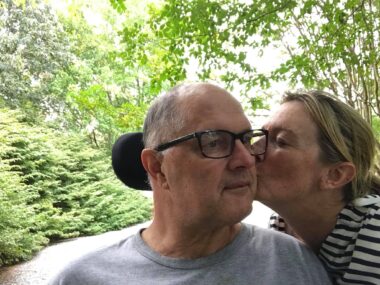After ALS, hospital waiting rooms bring memories, reflection
An annual medical screening conjures strong emotions of love and loss

Today I had a mammogram. We have a family history of certain cancers, so I’m careful to get recommended screenings. After losing my husband, Jeff, to ALS, I feel a bittersweet commitment to taking care of myself as he would want.
Looking after my health after he’s gone, however, brings into focus how differently I now view the world: with gratitude for medical care and sorrow that it couldn’t save my husband.
Medical appointments like the one I had today are visceral reminders of our experiences during 19 months of living with Jeff’s ALS. What will the test results show? How would I handle difficult news? Would I face a medical challenge with the same grace and bravery I saw in Jeff and so many other people I love?
For me, this flood of emotions seems to happen in the most unexpected of places — hospital waiting rooms. It’s where Jeff and I spent many hours together, hoping, reflecting, bargaining, and deciding.
Jeff was an innate caregiver. Above all else, he valued tending to the people and pets that he loved. He kept a small and incredibly tight network of family, close friends, colleagues, and other loved ones, and there was nothing he wouldn’t do for any of us. He was the person to call at 3 a.m. when a car broke down. He was the guy who, as an adult, delivered his dad a lottery ticket on his way to work each day, changing the lightbulbs or taking out the trash for his mom during the visit. Being the person that brought comfort to others defined him, both personally and professionally.
That’s the reason Jeff would accompany me to my mammogram each year. He would take a seat beside me in the waiting room — we always sat in the same two chairs — while I waited to be called back, then he’d wait alone while my screening was completed. I was always a little nervous, and his presence each year was reassuring, reminding me that I wasn’t alone. In truth, I knew, he had a vested interest in the results just as I did.
Our roles were reversed when ALS was mentioned as a possible reason for Jeff’s minor symptoms in 2018. I came along to appointments just as he had, this time occupying a single waiting room chair until it became clear that I needed to be in the exam rooms as well.

Jeff and Juliet on an excursion in their neighborhood in September 2019, nearly one year after Jeff’s ALS diagnosis. (Courtesy of Juliet Taylor)
ALS changed our experience of doctors’ appointments and waiting rooms. After Jeff died, I was reviewing some medical records and stopped counting, out of disbelief, when I reached over 100 visits — radiologists, neurologists, orthopedists, urologists, emergency medicine, and so many others — between his initial symptoms and his death.
Sometimes, sitting together and waiting, we knew intuitively what news we were likely to hear. The second-opinion appointment confirming Jeff’s ALS diagnosis was one of those times. Other times, especially before his diagnosis, we were hoping to solve pieces of a puzzle in our favor. And eventually, at our regular ALS clinic, we grew to understand the routine and look forward to seeing our care team.
At the clinic, we’d wait side by side in two identical chairs near the registration desk, our chosen spot. We always sat in these exact same chairs at each appointment, and I wonder now if that was part of reassuring ourselves, of feeling some sense of normalcy and control at a time when we seemed to have very little of either.
I remember, too, waiting alongside other families who were living with ALS. It was sobering to see the ravages of this disease on others, just as it was hopeful to see those who shared that they’d been living well with ALS for many years.
On one clinic visit, for example, a young man lifted his arms triumphantly, calling happily to us, “Five years!” on his way out of an exam room. We were overjoyed for him, even as we knew Jeff’s time with the disease would likely be shorter. Brief, yet profound, moments of joy and sadness were part of our time spent in waiting rooms.
Today, I waited alone for my mammogram, deliberately choosing a different set of chairs than those Jeff and I had used. I thought about him throughout the duration of my appointment — how much I miss him, how the last time he had joined me here, we had no idea what lay ahead for him, for us. I stared in the mirror in the dressing room, looking tired but feeling grateful to be where I needed to be, and thanking him for that.
When I returned to the waiting room later, I hesitated, turned, and took Jeff’s old seat.
Note: ALS News Today is strictly a news and information website about the disease. It does not provide medical advice, diagnosis, or treatment. This content is not intended to be a substitute for professional medical advice, diagnosis, or treatment. Always seek the advice of your physician or other qualified health provider with any questions you may have regarding a medical condition. Never disregard professional medical advice or delay in seeking it because of something you have read on this website. The opinions expressed in this column are not those of ALS News Today or its parent company, Bionews, and are intended to spark discussion about issues pertaining to ALS.








Jo Stockly
Juliet, you brought tears to my eyes with your heart tugging and all too familiar experience. I love it that you sat in his chair! Thank you for sharing this little glimpse of the life of Jeff; my Gary was a good guy too.
Doris Sutherland
Juliet, you made my heart sad and then very happy. My husband was diagnosed on September 14, 2022. We are extremely close, given we didn’t have children, unfortunately. It’s me, hubby and the dog. And of course the dog is the boss. Yesterday, we had a swallowing test. The radiologist said and I quote, “I don’t have anything to say and I almost always have something to add. Your swallowing is real good. Nothing is going the wrong way. Your wife said you sometimes get strangled on water. Just slowdown and sip your water and that’s it.”
Tears came to my eyes because there so many other functions that are not so good. So, to hear all is good was God sent. Thanks for sharing your journey with your loved one.
Ray C.
Juliet, I've read several of your articles about the experiences you all went through with ALS. It's very heartbreaking to read about these - and in fact this article really hit home for me as I had a major medical issue in 2012 that required me to be in and out of hospitals and doctors offices. The stress of waiting for diagnostic tests and understanding about the various procedures can leave the patient and family drained. Additionally, I knew and worked with Jeff in his career as a special agent. In fact, I worked closely with him during the Salt Lake City Olympics in 2002 - where I first met him. I was also a member of the ALS Association in the Washington DC Chapter when it was formed in the early 1990s. Your articles hit a nerve with me when I read them because of all the dots that were seemingly connected. I was so very sorry to read about Jeff's passing from this terrible illness. We all hold out hope that causes and treatments will be identified that will end it once and for all.